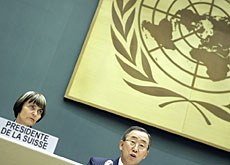Experts debate role of agriculture in aid

Agriculture should play an essential role in reducing global poverty, delegates at an international meeting in the Swiss capital, Bern, heard on Friday.
The authors of a report into the issue said that more investment in agriculture in developing countries was needed if the international community was to achieve its goal of halving the number of the world’s poor by 2015.
This target has been set out by the United Nations as the first of its Millennium Development Goals (MDGs).
The Swiss Agency for Development and Cooperation (SDC) had invited two of the authors of the World Bank’s 2008 World Development Report to Bern to discuss poverty and agriculture issues with Swiss experts.
This is the first time in 25 years that the annual World Development Report has focused on agriculture.
According to the study, three quarters of those living on less than $1 (SFr1.1) a day live in rural areas, but only four per cent of total official development assistance goes to agricultural projects.
A similar situation is often found within developing countries, noted the report. In countries in Sub-Saharan Africa only four per cent of public expenditure is estimated to be spent on more efficient agricultural production. However, 65 per cent of the workface is employed in farming.
“Greater attention” needed
“If we are going to meet the millennium development goals, we have to give much greater attention to agriculture on the development agenda,” said Derek Byerlee, a co-author of the report.
It is clear that agriculture can act as a trigger for growth; this has already been the experience of countries like China, India and Vietnam, said the World Bank.
Agricultural development offers “pathways out of poverty”, the speakers explained, but both donors and governments need to invest more and to invest better.
The SDC currently spends around SFr120-150 million annually on “agriculture and rural development”, which is one of its top ten priority themes.
In terms of what can be done to boost agriculture, the report’s authors said increasing the assets of poor households and making smallholders more productive were key aims.
Non-farming income will play an important part in leading people out of poverty; this includes such activities as transport and small processing industries – but these require outside input, in the form of better education and access to credit.
Challenges
Despite the report’s optimism, it is clear that there are still plenty of challenges, said the experts. Little progress has been made in correcting trade distortions, and land and water are becoming scarcer.
Climate change is another issue – agriculture will have to adapt, but it can also help to mitigate the effects of global warming.
Consumers in the west also have a part to play. New trends are having a positive effect for developing countries, Hanspeter Egler of the Swiss State Secretariat for Economic Affairs told swissinfo.
“It opens up new income possibilities. You have fair trade, organic products, speciality products, and retailers in the western world are very much interested in offering this to the public,” he said.
Overall, Byerlee was upbeat about prospects for the implementation of the report’s recommendations. The authors are currently presenting their findings to interested parties around the world.
“All the signs are very positive at the moment,” he said.
swissinfo, Julia Slater
The World Bank’s 30th annual report is entitled “Agriculture for development”.
It is the first time in 25 years that the report has focussed on agriculture.
Three quarters of the poor people in developing countries live in rural areas.
The Millennium Development Goal set by the world community aims to halve the proportion of people living in poverty by 2015.

In compliance with the JTI standards
More: SWI swissinfo.ch certified by the Journalism Trust Initiative











You can find an overview of ongoing debates with our journalists here . Please join us!
If you want to start a conversation about a topic raised in this article or want to report factual errors, email us at english@swissinfo.ch.